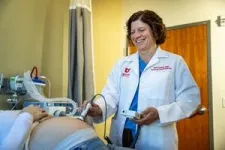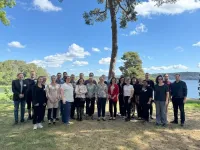(Press-News.org) Nearly one in 10 people who get COVID while pregnant will go on to develop long COVID, a report publishing July 11th in Obstetrics & Gynecology has found.
“It was surprising to me that the prevalence was that high,” says Torri Metz, MD, vice chair of research of obstetrics and gynecology at University of Utah Health, who co-led the nationwide study. “This is something that does continue to affect otherwise reasonably healthy and young populations.”
Intersecting risks
Prior research had shown that COVID affects pregnant people in uniquely risky ways. A COVID infection during pregnancy is more likely to lead to hospitalization or death, compared to an infection outside of pregnancy. COVID also increases the risk of pregnancy-related complications such as preterm birth or stillbirth. But until this study, the risk to pregnant people of developing long COVID was unknown.
The researchers enrolled more than 1500 people nationwide who had been sick with COVID for the first time while pregnant, and assessed self-reported long COVID symptoms at least six months after infection. As part of the National Institutes of Health RECOVER project, a massive nationwide collaboration to understand and treat long COVID, the large size of the study established solid associations and provided a picture of risk that was accurate for pregnant people across demographic groups.
The researchers found that 9.3% of people who contracted COVID during pregnancy went on to experience long-term symptoms. Some of the most common long COVID symptoms participants experienced were fatigue, gastrointestinal issues, and feeling drained or exhausted by routine activities.
"This is a critical study as pregnancy and the post-partum period are one of the most vulnerable times in an individual's life," said David Goff, M.D., Ph.D., division director for the Division of Cardiovascular Sciences at the NIH’s National Heart, Lung, and Blood Institute. "By better understanding how individual characteristics interact with SARS-CoV-2 infection during pregnancy and lead to an increased risk of long COVID, this study yields important insights to potentially develop targeted interventions for this population."
Because the symptoms of long COVID can overlap with the symptoms of pregnancy itself, Metz says that it’s especially important for obstetricians to be vigilant for them. “I doubt most obstetric clinicians are as aware of long COVID as perhaps we should be,” Metz says. “But people are having these symptoms, and we need to make sure that we’re not forgetting that these could be long-term manifestations of their SARS-CoV-2 infection.”
To ensure that the reported long COVID symptoms weren’t symptoms of pregnancy, the researchers did a secondary analysis that was restricted to people who reported symptoms more than 12 weeks after giving birth. The estimated risk of long COVID remained similar, confirming the initial findings.
Metz says that while the rate of long COVID observed was surprisingly high, it could underestimate the actual risk of long COVID for pregnant people. On average, people reported whether or not they had symptoms of long COVID 10 months after their initial infection, which means that the study could have missed people whose symptoms resolved earlier.
Several factors were associated with an increased risk of long COVID. People with anxiety or depression prior to their infection, as well as people with obesity, were more likely to experience lasting symptoms. Self-reported financial hardship was also associated with higher rates of long COVID, although the study could not determine whether financial difficulties were a cause or a consequence of extended symptoms.
“Our results highlight that people who were pregnant when they got COVID may have significant long-term symptoms after pregnancy, like fatigue even after simple activities that they did before the infection," says senior author Vanessa Jacoby, MD, MAS, director of the Clinical and Translational Science Institute at UCSF, and a professor of obstetrics, gynecology, and reproductive sciences as well as Associate Vice Chancellor for Clinical Research. "We encourage people to speak with their healthcare provider about persistent symptoms to connect with appropriate support and care," she says.
A continued concern
Previous estimates of long COVID rates following infection in the general population range from 10% to over 20%, putting the researchers’ results on the lower end of the risk spectrum. Metz says that this could be because pregnant people’s immune systems tend to react less strongly to infection. This puts pregnant people at higher risk of severe symptoms during the infection, but may put them at lower risk of long-term organ damage that can lead to persistent symptoms. Pregnant people tend to be overall younger and healthier than other populations, which could also contribute to the difference.
But the high prevalence of long COVID, including in pregnant populations, emphasizes that health practitioners should keep an eye out for its symptoms, Metz says. “We need to have this on our radar as we’re seeing patients. It’s something we really don’t want to miss. And we want to get people referred to appropriate specialists who treat long COVID.”
U of U Health’s Long COVID Clinic specializes in caring for patients with prolonged symptoms of COVID-19. Learn more about the clinic here.
###
About RECOVER: The National Institutes of Health Researching COVID to Enhance Recovery (NIH RECOVER) Initiative brings together clinicians, scientists, caregivers, patients, and community members to understand, diagnose, and treat long COVID. RECOVER has created one of the largest and most diverse groups of Long COVID study participants in the world. In addition, RECOVER clinical trials are testing potential interventions across five symptom focus areas. For more information, please visit recoverCOVID.org.
###
This research was published as “Post–Acute Sequelae of Severe Acute Respiratory Syndrome Coronavirus 2 (SARS-CoV-2) After Infection During Pregnancy” in Obstetrics and Gynecology.
The study was funded by the National Institutes of Health (NIH) Agreements OTA OT2HL161847, OT2HL161841 and OT2HL156812 as part of the Researching COVID to Enhance Recovery (RECOVER) Research Initiative.
The content is solely the responsibility of the authors and does not necessarily represent the official views of the National Institutes of Health.
END
Nearly one in 10 pregnant people who get COVID will develop long COVID
2024-07-11
ELSE PRESS RELEASES FROM THIS DATE:
User control of autoplay can alter awareness of online video ‘rabbit holes’
2024-07-11
UNIVERSITY PARK, Pa. — The rabbit hole contains madness, according to author Lewis Carroll. Online, that madness manifests in the form of increasingly extreme content, often without users realizing it. A new study by Penn State researchers suggests that giving users control over the interface feature of autoplay can help them realize that they are going down a rabbit hole.
The work — which the researchers said has implications for responsibly designing online content viewing platforms and algorithms, as well as helping users better ...
UCF launches inaugural mentorship, scholarship initiative for students in AI
2024-07-11
VIDEO: https://www.youtube.com/watch?v=6j4zjqI21Gs
Faculty in UCF’s College of Sciences and College of Engineering and Computer Science are preparing incoming students to keep pace with the emerging multidisciplinary field of artificial intelligence.
A team of five faculty, led by UCF’s Center for Research in Computer Vision (CRCV), recently received a U.S. National Science Foundation grant totaling nearly $2.5 million over five years to serve as resources to uplift bright yet low-income or struggling ...
Ultrasound technology can be used to boost mindfulness, study finds
2024-07-11
One of the intriguing abilities of the human mind is daydreaming, where the mind wanders off into spontaneous thoughts, fantasies and scenarios, often without conscious effort, allowing creativity and reflection to flow freely.
In a new study published in Frontiers of Human Neuroscience, University of Arizona researchers used low-intensity ultrasound technology to noninvasively alter a brain region associated with activities such as daydreaming, recalling memories and envisioning the future. They found that the technique can ultimately enhance mindfulness, marking a major advancement in the field ...
Gravitational waves hint at dark matter and Big Bang mysteries
2024-07-11
RIVERSIDE, Calif. -- Gravitational Waves, ripples in space-time predicted by Einstein almost a century ago, were detected for the first time in 2015. A new study led by Yanou Cui, an associate professor of physics and astronomy at the University of California, Riverside, reports that very simple forms of matter could create detectable gravitational wave backgrounds soon after the Big Bang.
“This mechanism of creating detectable gravitational wave backgrounds may shed light on ...
Study identifies seductive language for narcissists in job postings and the implications
2024-07-11
Employers and recruiting firms frequently infuse job postings with words and phrases like “ambitious,” “thinks outside the box,” “communicates persuasively” and “thinks strategically.”
However, according to a forthcoming Management Science study, such keywords signify “rule-bender” (versus “rule-follower”) language and heavily draw narcissistic applicants who are more likely to engage in unethical or fraudulent behavior–significantly ...
Black Americans develop mental resilience to discrimination early
2024-07-11
DURHAM, N.C. -- No one likes to feel like they’re not getting the respect or courtesy they deserve. Think about the last time you felt talked down to, or treated as inferior, or got worse customer service than another person in line.
But by the time most Americans reach adulthood, Blacks may have developed better coping skills for these disappointments than their white counterparts, potentially limiting the toll such experiences take on their mental health.
That’s one of the key takeaways of a Duke University study looking at how young men and women in the U.S. react ...
Living near oil and gas activity linked to poor mental health during preconception
2024-07-11
EMBARGOED UNTIL 4 P.M. ET Thursday, July 11, 2024
Contact:
Jillian McKoy, jpmckoy@bu.edu
Michael Saunders, msaunder@bu.edu
##
As the oil and gas industry continues its rapid expansion throughout North America, a growing body of research has linked fossil fuel development to physical and mental health conditions during and after pregnancy, including preterm birth, birth defects, and psychological stress.
But it appears that oil and gas production may be hazardous to this population even before they become pregnant.
A new study led by Boston University School of Public Health (BUSPH) researchers suggests that ...
WISDOM project pioneers plan to secure cross-border data sharing to combat chronic immune mediated diseases affecting 10% of Europeans
2024-07-11
Integrating medical and research data, ensuring secure data sharing, and using advanced AI models offer immense possibilities to mitigate the impact of chronic immune-mediated diseases (CIMDs) affecting 10% of Europeans. The consortium aims to transform complex biological information into actionable insights.
WISDOM believes novel computational tools can provide valuable knowledge and guide decision-making throughout the patient journey, from diagnosis to treatment optimization.
“As a key partner in the WISDOM project, the European Multiple Sclerosis Platform (EMSP) is committed to ensuring that patients' voices and perspectives are central to ...
$3 million federal grant to fund University of Montana research on bats, climate change
2024-07-11
MISSOULA – Since 2006, a fast-moving disease known as white-nose syndrome has killed an estimated 6.7 million bats, wiping out entire colonies and decimating creatures that provide an integral means of pest control.
In response, a first-of-its-kind study by the University of Montana recently was funded by the National Science Foundation to provide critical insights on three North American bat species that are adapting to the dual threats of this disease and climate change.
Awarded nearly $3 million dollars, the project will officially start Sept. 1, but groundwork already is well underway this summer.
Although infectious diseases occur naturally in wildlife ...
Scientific definition of a planet says it must orbit our sun; A new proposal would change that
2024-07-11
Key takeaways
The International Astronomical Union defines a planet as a celestial body that orbits the sun, is massive enough that gravity has forced it into a spherical shape, and has cleared away other objects near its orbit around the sun.
Scientists now recognize the existence of thousands of planets, but the IAU definition applies only to those within our solar system.
The new proposed definition specifies that the body may orbit one or more stars, brown dwarfs or stellar remnants and sets mass limits that should apply to planets everywhere.
Planetary scientists are proposing ...






